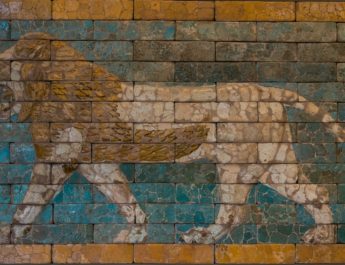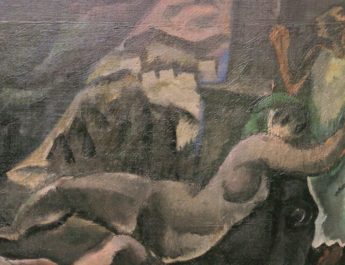Psalm 119:9-16
Fifth Sunday in Lent B
9 How can young peopleA keep their wayB pure?C
By guardingD it according to your word.E
A “young people” = naar. May be from na’ar (to shake, toss up and down, tumble around). This is a child or a servant. It is a child in their active years so they could be aged anywhere from infancy to adolescence.
B “way” = orach. From arach (to go, travel, wander). This is a road that is widely used, highway, caravan, traveler, troop.
C “keep…pure” = zakah. 8x in OT. This is being clear or see through, so figuratively it means being innocent or blameless. It can also be clear, cleansed, justified, or pure.
D “guarding” = shamar. This is to keep, watch, or preserve. It means to guard something or to protect it as a thorny hedge protects something.
E “word” = dabar. From dabar (to speak, declare, discuss). This is speech, a word, a matter, an affair, charge, command, message, promise, purpose, report, request. It is a word, which implies things that are spoken of in a wide sense.
10 With my wholeF heartG I seekH you;
do not let me strayI from your commandments.J
F “whole” = kol From kalal (to complete). This is all or every.
G “heart” = leb. From the same as lebab (the heart, courage, one’s inner self, the mind, the will; only used in a figurative sense in the Bible); may be related to labab (to encourage; properly, to be encased as with fat; used in a good sense, this means to transport someone with love; used in a bad sense, it can mean to dull one’s senses).. This is inner self, mind, will, feelings, the center.
H “seek” = darash. This is seek, ask, inquire, care for. Generally it means following in pursuit or following as part of a search, which implies seeking or asking. Also used specially to mean worship.
I “stray” = shagah. This is to mislead, stray, wander, deceive. It is to sin from ignorance, to make a mistake. It can also mean being enraptured.
J “commandments” = mitsvah. From tsavah (to charge, command, order, enjoin). This is a commandment, law, ordinance obligation, or tradition. It is something commanded whether by God or by a human authority. This term is sometimes used collectively to refer to the Law.
11 I treasureK your wordL in my heart,
so that I may not sinM against you.
K “treasure” = tsaphan. From tsaphan (to hide, hoard, reserve; to cover over or figuratively to deny; also to lurk). This is properly hidden, dark, or gloomy. It can also be used to refer to the north.
L “word” = imrah. From emer (speech, thing, utterance, promise, argument, command); from amar (to speak, say, answer, command, promise, report). This is any kind of utterance, a word or commandment.
M “sin” = chata. This is properly to miss, and so figuratively it is used for sinning, bearing the blame. It implies a forfeiture or loss of something.
12 BlessedN are you, O Lord;O
teachP me your statutes.Q
N “blessed” = barak. This is to kneel, to bless. It is blessing God as part of worship and adoration or blessing humans to help them. It can be used as a euphemism to say curse God.
O “Lord” = YHVH. From havah (to be, become) or hayah (to come to pass, become, be). This is the name of the God of Israel, the self-existent and eternal one, the tetragrammaton. This pronunciation has been lost to time so “Lord” is generally used in its place.
P “teach” = lamad. Properly, this refers to goading (using a pointed stick to guide or prod one’s flock). By implication, it means teaching or instructing.
Q “statutes” = choq. From chaqaq (to inscribe, carve, or decree; a lawmaker; literally, this is engraving, but it implies enacting a law because laws were carved into stone or metal). This is statute, boundary, condition, custom, limit, ordinance It is something that is prescribed or something that is owed.
13 With my lipsR I declareS
allT the ordinancesU of your mouth.V
R “lips” = saphah. This is lip, edge, border, bank – used for a boundary. It can also be speech or language.
S “declare” = saphar. From sepher (writing, document, book, evidence). This is properly to tally or record something. It can be enumerate, recount, number, celebrate, or declare.
T “all” = kol. Same as “whole” in v10. See note F above.
U “ordinances” = mishpat. From shaphat (to judge, defend, pronounce judgment, condemn, govern). This is a verdict or formal sentence whether from humans or from God. It includes the act of judging as well as the place that judging takes place, the suit itself, and the penalty. Abstractly, this is justice, which includes the rights of the participants.
V “mouth” = peh. This is mouth in a literal or figurative sense. So, more literally, it can be beak or jaws. More figuratively, it refers to speech, commands, or promises.
14 I delightW in the wayX of your decreesY
as much as in all riches.Z
W “delight” = sus. This is to rejoice or be glad. Properly, it is to be bright or cheerful.
X “way” = derek. From darak (to tread, march, to walk. Can also mean affixing a string to a box since one needs to step on it to bend it in the process; so also an archer). This is a road as a thing that is walked on. Can be used figuratively for the path that one’s life takes or how one chooses to live one’s life.
Y “decrees” = eduth. From ed (witness, testimony, recorder); from ud (to admonish, repeat, duplicate, testify, restore, record, relieve). This is testimony, ordinance, decree, warning, or witness.
Z “riches” = hon. From ed (witness, testimony, recorder); from ud (to admonish, repeat, duplicate, testify, restore, record, relieve). This is testimony, ordinance, decree, warning, or witness.
15 I will meditateAA on your preceptsBB
and fix my eyesCC on your ways.DD
AA “meditate” = siach. From siach (musing, meditation, communication, babbling, prayer, contemplation). This is to muse, meditate, complain, sing, sigh, speak, or utter.
BB “precepts” = piqqud. From paqad (to attend to or visit – can be used for a friendly or violent encounter; to oversee, care for, avenge, or charge). This is something that is appointed or decreed by God. It can refer to the Law as a whole or a commandment individually.
CC “fix…eyes” = nabat. This is to behold, look at intently, consider, or scan. It can mean to have respect or regard someone favorably.
DD “ways” = orach. Same as “way” in v9. See note B above.
16 I will delightEE in your statutes;FF
I will not forgetGG your word.
EE “delight” = sha’a. 9x in OT– all in the Psalms and Isaiah. This is to play, delight, stare, cry out, cheer. It can also be to shut eyes, to be blind.
FF “statutes” = chuqqah. Related to “statutes” in v12. From choq (see note Q above. This is something prescribed such as a statue, custom, or ordinance.
GG “forget” = shakach. This is to forget because of not remembering something or not paying attention to it. It can also mean to mislay.
Image credit: “Poor Little Basse!” by John Bauer, 1912.




